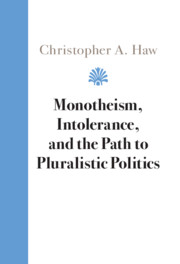Book contents
- Monotheism, Intolerance, and the Path to Pluralistic Politics
- Monotheism, Intolerance, and the Path to Pluralistic Politics
- Copyright page
- Contents
- Preface
- Abbreviations
- Introduction
- 1 Pluralism’s Requisite Intolerance
- 2 Girard’s Mimetic Theory and Monotheism’s Ambivalent Effects
- 3 Monotheism and the Monopoly on Violence
- 4 Containing Violence and Two Entirely Different Kinds of Religion
- 5 Polytheism and the Victim in Ancient Egypt
- 6 A Political Theology of the Mosaic Distinction
- 7 Jesus Christ and Intolerance
- 8 Conclusion
- Bibliography
- Index
1 - Pluralism’s Requisite Intolerance
Published online by Cambridge University Press: 04 June 2021
- Monotheism, Intolerance, and the Path to Pluralistic Politics
- Monotheism, Intolerance, and the Path to Pluralistic Politics
- Copyright page
- Contents
- Preface
- Abbreviations
- Introduction
- 1 Pluralism’s Requisite Intolerance
- 2 Girard’s Mimetic Theory and Monotheism’s Ambivalent Effects
- 3 Monotheism and the Monopoly on Violence
- 4 Containing Violence and Two Entirely Different Kinds of Religion
- 5 Polytheism and the Victim in Ancient Egypt
- 6 A Political Theology of the Mosaic Distinction
- 7 Jesus Christ and Intolerance
- 8 Conclusion
- Bibliography
- Index
Summary
In Chapter 1, I lay out the paradox of “intolerance” as analyzed in the work of Chantal Mouffe. Her understanding of the incompatibility between liberalism and democracy illuminates the complex relationship between pluralism and intolerance. Of crucial concern is how Mouffe’s pluralism requires what I describe as apophatic intolerance, a refusal to lay hold of the Absolute and a refusal of political closure and pure tolerance.
Keywords
- Type
- Chapter
- Information
- Publisher: Cambridge University PressPrint publication year: 2021

